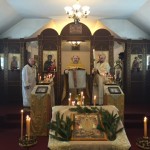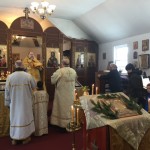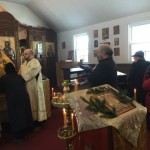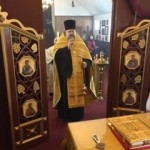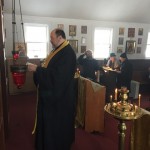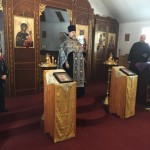On February 22, on the Cheesefare Sunday, the Rector of St. George Church, Archpriest Igor Tarasov served the Divine Liturgy. After the reading from the Gospel he preached a homily:
“Tomorrow we will start Lent, a time of fasting. Today, on the Cheesefare Sunday, as we prepare for that, we commemorate the expulsion of Adam and Eve from paradise. It is a proper time to make such commemoration. If we reflect upon that most sadly event in the history of mankind, we observe that the only commandment given by God the Creator to man was related to fasting. God told Adam and Eve that they may eat the fruits from any trees, but may not eat the fruit from one tree. This was the only commandment and it was about fast. However, Adam and Eve refused to fast. As a result they were expelled from paradise. Therefore, the day of expulsion may be compared to today’s day. After being excluded from blessedness, the mankind had to start a very long period of living in the fallen state, a long time of being cursed, sick, unhappy and needy. That period ended with the salvation accomplished by our Lord Jesus Christ becoming Man and dying for us on the cross. It completely ended by His glorious Resurrection. In the same manner, Lent is a pretty long time of our labors, struggles and efforts, both spiritual and corporal. It will also end with our reviving of the holy Passions of the Lord, His saving death on the cross and His holy Resurrection. Lent will end when the Holy Week will come, and we will stop fasting with the celebration of Pascha.”
“Although these aspects of the Cheesefare Sunday are very important, the Gospel of today does not mention that. It speaks about three other things. Our Lord Jesus Christ Himself gives us instructions for this saving time of Fast. He provides us, as some modern priest said, with the “three recipes for Lent”. These are the recipes of forgiveness, fasting and laying up treasures in heaven. While some of us may think what kind of meals we will cook during Lent when many of our regular types of food are not allowed, we may consider those three spiritual recipes not for our table, but for our way of living.”
“The first recipe is to forgive others their faults against us. Every day we should remember about our duty to forgive because we remind ourselves reciting the Lord ’s Prayer. We declare: “And forgive us our debts as we forgive our debtors”. We should then know that if we forgive, then the Lord will forgive us. He confirms this in today’s Gospel: “For if you forgive men their trespasses, your heavenly Father will also forgive you. But if you do not forgive men their trespasses, neither will your Father forgive your trespasses” (Mt. 6, 14-15). Why should we forgive? Because after Adam whom we commemorate, no man is perfect, everybody makes mistakes, commits sins. If we do not forgive, we are not honest with ourselves. We are proud and extol ourselves. Then God will despise us for that, as we heard in the parable of the Publican and Pharisee. Forgiveness is the expression of humility, an acknowledgement of our sinful state. It is also an expression of love. If we forgive, God will forgive us.”
“The second recipe is fasting. It is important. The Lord did not say that fasting is not needed. But He teaches us that it must be spiritual, not just for the body; it must be profound, not superficial. Recently we spoke of the fasting done by the Pharisees. The Lord criticized this type of fasting. He calls us for the spiritual, profound and fruitful fasting. Fast by itself is not the goal, but the means to attain the goal which is spiritual life.”
“The third recipe is to lay up treasures in heaven. It is a good financial advice. Many people care very much about collecting earthly treasures, making good investments, preserving their material wealth. Our Lord Jesus Christ declares all this to be unreliable. He reminds us that all material wealth and earthly treasures may be destroyed or taken away. Finally, no one will be able to carry them into eternity. Thus, it is unwise to invest in those things. We should rather invest into things we may carry into eternal life. And these treasures laid up in heaven would be our good deeds, our works of love, our endeavors of faith. They will lay up and wait for us in heaven where we will be blessed according to them.”
“Therefore, dear brothers and sisters, let us take and use those three recipes for Lent in order to achieve a right to worthily celebrate Holy Pascha after it, and also to have a right some day to enter again into the paradise which is God’s eternal and heavenly Kingdom.”
Following the Divine Liturgy the Rector performed Vespers with the Rite of Forgiveness. After the singing of the Great prokimenon he changed his priestly vestments to the Lenten color of black. Following the Vespers dismissal Fr. Igor preached a brief sermon about Lent in the Russian language. He emphasized the need of forgiveness as a sign of love and honest attitude towards human sinful state.
The Rector asked for forgiveness bending his knees. The parishioners also knelt down and asked their pastor for forgiveness. Then each one of the faithful could come to the Rector to kiss the cross and to express forgiveness.
After the services of this special day the Rector and parishioners joined at the Blini Lunch. We enjoyed delicious meals, especially the blini.

